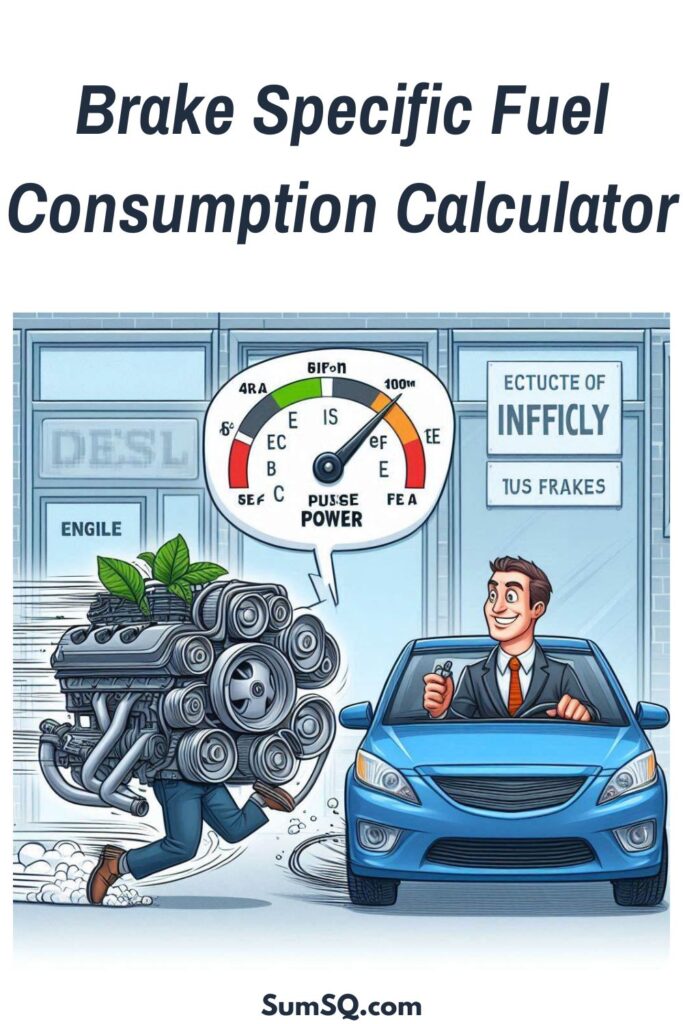BSFC calculator
Enter any 2 values to calculate the missing variable
What is Brake Specific Fuel Consumption (BSFC)?
Brake Specific Fuel Consumption, often abbreviated as BSFC, is a measure of how efficiently an engine uses fuel to produce power. It represents the rate of fuel consumption divided by the power output of an engine. BSFC is typically expressed in grams per kilowatt-hour (g/kWh) or grams per joule (g/J). A lower BSFC value indicates a more efficient engine, as it means the engine is using less fuel to produce the same amount of power.
The Importance of BSFC
Understanding BSFC is crucial for several reasons:
- Engine Efficiency: It provides a clear indication of how efficiently an engine converts fuel into useful work.
- Performance Comparison: BSFC allows for comparison between different engines or the same engine under various operating conditions.
- Fuel Economy: It helps in estimating fuel consumption and, consequently, operational costs.
- Environmental Impact: Lower BSFC often correlates with reduced emissions, making it an important consideration in today’s eco-conscious world.
BSFC Formula and Calculation
The basic formula for calculating BSFC is:
BSFC = Fuel Consumption Rate / Power Output
Where:
- BSFC is measured in g/J (grams per joule) or g/kWh (grams per kilowatt-hour)
- Fuel Consumption Rate is in g/s (grams per second)
- Power Output is in watts (W) or kilowatts (kW)
To convert between g/J and g/kWh, use the following relationship:
1 g/kWh = 2.778 × 10^-7 g/J
Factors Affecting BSFC
Several factors can influence an engine’s BSFC:
- Engine Design: The overall design, including compression ratio and combustion chamber shape, plays a significant role.
- Operating Conditions: Factors like engine speed, load, and temperature affect BSFC.
- Fuel Type: Different fuels have varying energy densities, impacting BSFC.
- Maintenance: Well-maintained engines generally have better BSFC values.
Using the BSFC Calculator
To help you calculate BSFC easily, we’ve provided a simple calculator tool. Here’s how to use it:
Simple Calculator:
- Enter the Fuel Consumption in g/s (grams per second).
- Input the Power Output in watts.
- The calculator will automatically compute the BSFC in g/J (grams per joule).
Advanced Calculator:
- Enter the Total Fuel Consumption in grams.
- Input the Total Energy Produced in joules.
- The calculator will determine the Average BSFC in g/J.
In both calculators, you can enter any two values, and the tool will calculate the third. This flexibility allows for various scenarios and problem-solving approaches.
Interpreting BSFC Results:
When using the calculator, keep these points in mind:
- Lower BSFC values indicate higher efficiency.
- Typical BSFC values for modern gasoline engines range from 200 to 300 g/kWh.
- Diesel engines often have lower BSFC values, typically between 180 to 250 g/kWh.
- Very low BSFC values (below 150 g/kWh) are exceptional and usually seen in large, highly optimized engines.
Practical Applications of BSFC
Understanding and calculating BSFC has several practical applications:
- Engine Design and Optimization:
Engineers use BSFC to evaluate and improve engine designs. By analyzing BSFC across different operating conditions, they can identify areas for improvement in fuel efficiency. - Vehicle Performance:
In the automotive industry, BSFC helps in assessing vehicle performance and fuel economy. It’s particularly useful in developing fuel-efficient vehicles and meeting emission standards. - Power Generation:
For power plants and generators, BSFC is a key metric in determining operational efficiency and fuel costs. It helps in selecting the most efficient engines for power generation. - Marine and Aviation:
In ships and aircraft, where fuel consumption is a critical factor, BSFC calculations aid in route planning and fuel management. - Research and Development:
BSFC is an essential parameter in engine research, helping in the development of new technologies and fuels.
Relationship Between BSFC and Other Engine Parameters
To fully understand BSFC, it’s important to consider its relationship with other engine parameters:
- Brake Power:
Brake power is the usable power output of an engine. The brake power equation is:
Brake Power = Torque × Angular Velocity
Where:
- Brake Power is measured in watts (W)
- Torque is in newton-meters (N·m)
- Angular Velocity is in radians per second (rad/s)
BSFC is directly related to brake power, as it measures how efficiently this power is produced relative to fuel consumption.
- Specific Fuel Consumption (SFC):
SFC is similar to BSFC but doesn’t account for frictional losses in the engine. The SFC formula is:
SFC = Fuel Flow Rate / Power Output
BSFC is generally preferred as it provides a more realistic measure of engine efficiency.
- Thermal Efficiency:
Thermal efficiency is the ratio of work output to the energy input from fuel. A lower BSFC generally correlates with higher thermal efficiency.
Common Misconceptions About BSFC
- Lower is Always Better: While lower BSFC generally indicates better efficiency, extremely low values might suggest measurement errors or unrealistic conditions.
- Constant Across All Conditions: BSFC varies with engine speed and load. It’s important to consider the entire operating range.
- Direct Indicator of Fuel Economy: While related, BSFC doesn’t directly translate to fuel economy in vehicles, as other factors like transmission efficiency and aerodynamics play roles.
Tips for Improving BSFC
- Regular Maintenance: Keep the engine well-tuned and follow manufacturer’s maintenance schedules.
- Optimal Operating Conditions: Run the engine at its most efficient speed and load whenever possible.
- Use of Technology: Employ technologies like turbocharging, direct injection, and variable valve timing.
- Quality Fuel: Use the recommended fuel grade for your engine.
- Weight Reduction: In vehicles, reducing weight can improve overall efficiency.
Challenges in Measuring BSFC
Accurately measuring BSFC can be challenging due to:
- Variability in Operating Conditions: Engine performance can fluctuate based on temperature, humidity, and other environmental factors.
- Measurement Precision: Accurate fuel flow and power output measurements are crucial for precise BSFC calculations.
- Test Duration: Longer test periods generally provide more accurate results but are more resource-intensive.
Conclusion
Brake Specific Fuel Consumption is a fundamental concept in understanding and improving engine efficiency. By using the provided calculator and understanding the principles behind BSFC, you can gain valuable insights into engine performance. Whether you’re a student, professional, or enthusiast, this knowledge can help you make informed decisions about engine design, vehicle selection, or equipment operation. As we continue to strive for more efficient and environmentally friendly energy use, the importance of metrics like BSFC will only grow.






